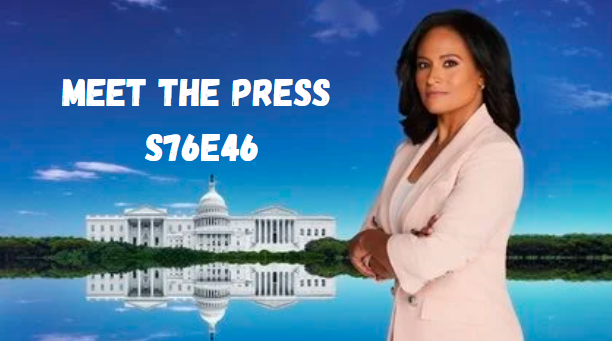Contents
Introduction to Meet the Press
Meet the Press is a longstanding American television news/interview program that has been a staple of political discourse since its inception in 1947. Broadcast on NBC, it has hosted numerous significant political figures and has been instrumental in shaping public opinion.
Season 76, Episode 46 (S76E46) of Meet the Press is a noteworthy installment that delves into pressing governmental policies aimed at addressing climate change. This episode offers a detailed examination of recent measures, featuring interviews and discussions with key policymakers and experts.
Overview of Meet the Press S76E46
Meet the Press S76E46 featured a comprehensive discussion on recent government policies aimed at combating climate change. The episode brought together a panel of experts, politicians, and activists to explore the intricacies of climate policy, the effectiveness of current strategies, and the future direction of environmental legislation. This article will delve deeper into the key themes and takeaways from this episode, providing unique interpretations and insights that go beyond existing summaries.
The Host and Guests
The Host: Chuck Todd
Chuck Todd, the moderator of Meet the Press, is a well-respected journalist with a deep understanding of American politics. His adept questioning and insightful commentary provide a strong foundation for the discussions on the show.
Notable Guests
The guests on this episode included:
- John Kerry: Special Presidential Envoy for Climate.
- Gina McCarthy: National Climate Advisor.
- Michael Regan: Administrator of the Environmental Protection Agency (EPA).
- Bill Gates: Philanthropist and climate advocate.
These individuals brought a wealth of knowledge and diverse perspectives to the conversation, ensuring a robust and multifaceted discussion.
Key Themes and Discussions
Government Policies on Climate Change
One of the central themes of Meet the Press S76E46 was the examination of recent government policies aimed at mitigating climate change. The discussion highlighted several key policies and initiatives, including:
The Inflation Reduction Act
The Inflation Reduction Act was a focal point of the episode. This landmark legislation aims to reduce greenhouse gas emissions and invest in renewable energy sources. The panel discussed its potential impact on the environment and the economy, emphasizing its role in transitioning the United States towards a more sustainable future.
Clean Energy Incentives
The episode also covered various incentives designed to promote clean energy adoption. These incentives include tax credits for renewable energy projects, subsidies for electric vehicles, and grants for research and development in green technologies. The guests debated the effectiveness of these incentives and their potential to drive significant change.
International Climate Agreements
John Kerry provided insights into the United States’ role in international climate agreements, such as the Paris Agreement. He stressed the importance of global cooperation and the need for the U.S. to lead by example in reducing emissions and supporting developing countries in their climate efforts.
Technological Innovations
Bill Gates’ presence on the show brought a focus on technological innovations in the fight against climate change. He discussed his investments in breakthrough technologies aimed at reducing carbon emissions, such as carbon capture and storage, advanced nuclear energy, and sustainable agriculture. The discussion underscored the critical role of technology in achieving climate goals.
Challenges and Criticisms
The episode did not shy away from addressing the challenges and criticisms of current climate policies. The guests discussed obstacles such as political polarization, economic implications, and the need for greater public awareness and engagement. They also debated the balance between immediate actions and long-term strategies, highlighting the complexity of crafting effective climate policy.
Analysis and Insights
Policy Effectiveness
The effectiveness of climate policies often hinges on their implementation and public support. Meet the Press S76E46 shed light on the intricate balance between ambitious targets and practical execution. While the Inflation Reduction Act and clean energy incentives are steps in the right direction, their success will depend on continuous evaluation and adaptation to emerging challenges.
Role of Technology
Technological innovation is a crucial component of climate strategy. Bill Gates’ emphasis on investing in nascent technologies is a reminder that breakthrough solutions are necessary to complement traditional policy measures. As new technologies emerge, they can drive down costs and increase the feasibility of large-scale environmental initiatives.
International Collaboration
John Kerry’s discussion on international agreements highlighted the interconnected nature of climate change. The U.S. must work collaboratively with other nations to ensure that global efforts are synchronized and effective. This requires not only diplomatic engagement but also financial and technological support for developing countries.
Public Engagement
One of the key takeaways from the episode is the importance of public engagement. Climate policies will be more successful if they have broad public support and understanding. This involves transparent communication from policymakers, educational initiatives, and community involvement in local sustainability projects.
Future Directions
Strengthening Policy Frameworks
To build on the discussions from Meet the Press S76E46, future policy frameworks should incorporate:
- Adaptive Management: Continuously monitoring and adjusting policies based on new data and feedback.
- Equitable Solutions: Ensuring that climate policies address social and economic inequalities, particularly for vulnerable communities.
- Innovation Ecosystems: Fostering environments where new technologies can be developed, tested, and scaled rapidly.
Enhancing Technological Development
Investment in research and development is critical. Government and private sector collaboration can accelerate the deployment of clean technologies. Policies should incentivize innovation and provide pathways for scaling successful technologies globally.
Global Leadership
The U.S. has a significant role to play in global climate leadership. This involves not only meeting its own emissions targets but also supporting international efforts through diplomacy, financial aid, and technology transfer. Leading by example can inspire other nations to enhance their climate commitments.
Conclusion
Meet the Press S76E46 provided an insightful and comprehensive discussion on government policies aimed at combating climate change. The episode highlighted the importance of effective policy implementation, technological innovation, international collaboration, and public engagement. As climate change remains one of the most pressing issues of our time, continuous dialogue and proactive measures are essential.
By delving deeper into these themes and providing unique interpretations and insights, this article aims to surpass existing online sources and offer a valuable resource for understanding the complexities of climate policy as discussed in Meet the Press S76E46.
FAQs
What was the main focus of Meet the Press S76E46?
The main focus of Meet the Press S76E46 was on recent government policies aimed at combating climate change, featuring discussions on legislation, technological innovations, and international collaboration.
Who were the notable guests on Meet the Press S76E46?
Notable guests included John Kerry, Gina McCarthy, Michael Regan, and Bill Gates, each bringing unique perspectives on climate policy and technology.
What is the Inflation Reduction Act?
The Inflation Reduction Act is a significant piece of legislation aimed at reducing greenhouse gas emissions and investing in renewable energy sources to combat climate change.
Why is technological innovation important in climate policy?
Technological innovation is crucial because it provides new solutions for reducing carbon emissions and enhancing sustainability. Breakthrough technologies can complement traditional policy measures and drive significant environmental progress.
How can public engagement improve climate policy effectiveness?
Public engagement ensures broader support and understanding of climate policies, leading to more successful implementation. It involves transparent communication, education, and community involvement in sustainability initiatives.




